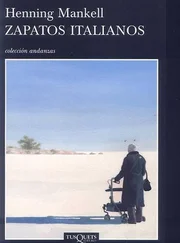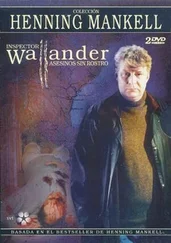Henning Mankell - One step behind
Здесь есть возможность читать онлайн «Henning Mankell - One step behind» весь текст электронной книги совершенно бесплатно (целиком полную версию без сокращений). В некоторых случаях можно слушать аудио, скачать через торрент в формате fb2 и присутствует краткое содержание. Жанр: Полицейский детектив, на английском языке. Описание произведения, (предисловие) а так же отзывы посетителей доступны на портале библиотеки ЛибКат.
- Название:One step behind
- Автор:
- Жанр:
- Год:неизвестен
- ISBN:нет данных
- Рейтинг книги:5 / 5. Голосов: 1
-
Избранное:Добавить в избранное
- Отзывы:
-
Ваша оценка:
- 100
- 1
- 2
- 3
- 4
- 5
One step behind: краткое содержание, описание и аннотация
Предлагаем к чтению аннотацию, описание, краткое содержание или предисловие (зависит от того, что написал сам автор книги «One step behind»). Если вы не нашли необходимую информацию о книге — напишите в комментариях, мы постараемся отыскать её.
One step behind — читать онлайн бесплатно полную книгу (весь текст) целиком
Ниже представлен текст книги, разбитый по страницам. Система сохранения места последней прочитанной страницы, позволяет с удобством читать онлайн бесплатно книгу «One step behind», без необходимости каждый раз заново искать на чём Вы остановились. Поставьте закладку, и сможете в любой момент перейти на страницу, на которой закончили чтение.
Интервал:
Закладка:
"Maybe," the boy replied.
Three different reactions, Wallander thought. Eva Hillstrom is afraid. Lillemor Norman is suspicious. Martin Boge's parents are relieved he's gone, and his brother in turn seems to prefer it when their parents are gone. He picked up his coat and left. On the way out, he reserved a new time at the laundry for Friday.
Although it wasn't far to Karinggatan, he took the car. The new exercise regimen would have to wait. He turned onto Karinggatan from Bellevuevagen, and stopped outside a white two-storey house. The front door opened as he was opening the gate, and he recognised Lillemor Norman. In contrast to Eva Hillstrom, she looked robust. He thought about the photographs in Martinsson's file and realised that Lena Norman and her mother looked alike.
The woman was holding a white envelope.
"I'm sorry to bother you," Wallander said.
"My husband will have a few words with Lena when she comes back. It's completely irresponsible of them to go away like this without a word."
"They're adults and can do as they please," Wallander said. "But of course it's both irritating and worrying."
He took the letter and promised to return it. Then he drove to the police station and went to the room where the officer on duty was manning the phones. He was taking a call as Wallander stepped into the room, but pointed to one of the fax machines. Klas Boge had faxed his brother's letter as promised. Wallander went to his office and turned on the desk lamp. He laid the two letters and the postcards next to each other, then angled the light and put on his glasses.
He leaned back in his chair. His hunch was correct. Both Martin Boge and Lena Norman had irregular, spiky handwriting. If someone had wanted to forge any one of the three's handwriting, the choice would have been clear: Astrid Hillstrom. Wallander felt profoundly disturbed by this, but his mind kept working methodically. What did this mean? It was nothing, really. It didn't supply an answer to why someone would want to write postcards in their names, and who would have had access to their handwriting. Nonetheless, he couldn't shake off his concern.
We have to go through this thoroughly, he thought. If something has happened, they've been missing for almost two months.
He got himself a cup of coffee. It was 10.15 p.m. He read through the description of events one more time but found nothing new. Some good friends had celebrated Midsummer's Eve together, then left for a trip. They sent a few postcards. And that was all.
Wallander shuffled the letters together and put them in the folder along with the postcards. There was nothing more he could do tonight. Tomorrow he would talk to Martinsson and the others, go through this Midsummer's Eve case one last time, and then decide if they would proceed with a missing persons investigation.
Wallander turned off the light and left the room. In the corridor he realised that Ann-Britt Hoglund's light was on. The door was slightly ajar, and he pushed it open gently. She was staring down at her desk but there were no papers in front of her. Wallander hesitated. She almost never stayed this late at the station. She had children to take care of, and her husband travelled often with his job and was rarely at home. He recalled her emotional behaviour in the canteen. And now here she was staring down at an empty desk. She probably wanted to be left alone. But it was also possible that she wanted to talk to somebody.
She can always ask me to leave, Wallander thought.
He knocked on the door, waited for her answer, and stepped inside.
"I saw your light," he said. "You aren't normally here so late, not unless something has happened."
She looked back at him without answering.
"If you want to be left alone, just say the word."
"No," she replied. "I don't really want to be left alone. Why are you here yourself? Is something going on?"
Wallander sat down in her visitor's chair. He felt like a big, lumbering animal.
"It's the young people who went missing at Midsummer."
"Has anything turned up?"
"Not really. There was just something I wanted to double-check. But I think that we'll need to do a thorough reexamination of the case. Eva Hillstrom is seriously concerned."
"But what could really have happened to them?"
"That's the question."
"Are we going to declare them missing?"
Wallander threw his arms out. "I don't know. We'll have to decide tomorrow."
The room was dark except for the circle of light projected onto the floor by the desk lamp.
"How long have you been a policeman?" she asked suddenly.
"A long time. Too long, maybe. But I'm a policeman through and through. That's not going to change, at least until I retire."
She looked at him for a long time before asking her next question. "How do you keep going?"
"I don't know."
"Don't you ever run out of steam?"
"Sometimes. Why do you ask?"
"I'm thinking of what I said in the canteen earlier. I told you I'd had a bad summer and that's true. My husband and I are having problems. He's never at home. It can take us a week to get back to normal after his trips, and then he just has to leave again. This summer we started talking about a separation. That's never an easy thing, especially when you have children."
"I know," Wallander said.
"At the same time I've started questioning my work. I read in the paper that some of our colleagues in Malmo were arrested for racketeering. I turn on the television and learn that senior members of the force are involved in the world of organised crime. I see all this and I realise it's happening more and more. Eventually it leads me to wonder what I'm doing. Or, to put it another way, I wonder how I'm going to last another 30 years."
"It's all coming apart at the seams," Wallander agreed. "It's been going on for a long time. Corruption in the justice system is nothing new and there have always been police officers willing to cross the line. It's worse now, of course, and that's why it's even more important that people like you keep going."
"What about you?"
"That applies to me too."
"But how do you do it?"
Her questions were full of anger. He recognised a part of himself in her. How many times had he sat staring into his own desk, unable to find a reason to continue?
"I try to tell myself that things would be even worse without me," he said. "It's a consolation at times. A small one, but if I can't think of any other I take it."
She shook her head. "What's happening to our country?"
Wallander waited for her to continue, but she didn't. A truck rattled past on the street outside.
"Do you remember that violent attack last spring?" Wallander asked.
"The one in Svarte?"
"Two boys, both 14 years old, attack a third boy who is only 12. There's no provocation, no reason behind it. When he's lying there unconscious they start stomping on his chest. Finally he's not just unconscious, he's dead. I don't think it ever hit me so clearly before. People have always had fights, but they would stop when the other person was down. You can call it what you like. Fair play. Something you take for granted. But that's not the way it is any more, because these boys never learned it. It's as if a whole generation has been abandoned by their parents. Or as if not caring has become the norm. You have to rethink what it means to be a police officer because the parameters have changed. The experience you've acquired after years and years of grinding work doesn't apply any more."
He stopped. They heard voices from the corridor. Some of the officers on night duty were talking about a drunk driver. Then everything went quiet again.
"How have you been these past few years?" he asked her.
"You mean since I was shot?"
He nodded.
Читать дальшеИнтервал:
Закладка:
Похожие книги на «One step behind»
Представляем Вашему вниманию похожие книги на «One step behind» списком для выбора. Мы отобрали схожую по названию и смыслу литературу в надежде предоставить читателям больше вариантов отыскать новые, интересные, ещё непрочитанные произведения.
Обсуждение, отзывы о книге «One step behind» и просто собственные мнения читателей. Оставьте ваши комментарии, напишите, что Вы думаете о произведении, его смысле или главных героях. Укажите что конкретно понравилось, а что нет, и почему Вы так считаете.












